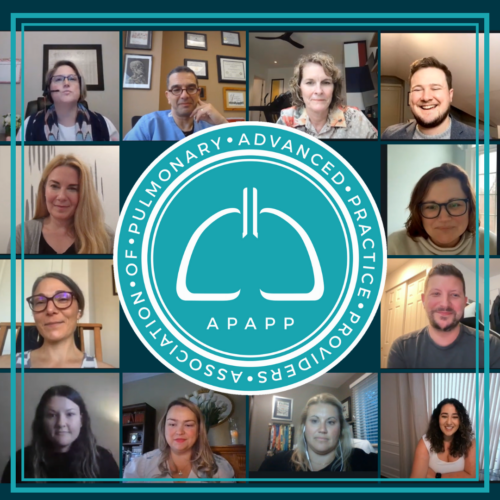The APAPP Podcast is a must-listen for Advanced Practice Providers (APPs), nurses, and healthcare professionals specializing in pulmonary medicine, critical care, and sleep disorders. Hosted by Corinne Young, the founder of the Association of Pulmonary Advanced Practice Providers, this podcast dives deep into the latest topics, treatments, and innovations in the field. Easily find episodes tailored to your interests by using the search bar below, or scroll down to explore our newest episodes. You can stream or download the APAPP Podcast on all major platforms, including Apple Podcasts and Spotify.
Looking for video content? Watch full episodes on our YouTube channel and on Spotify. Don’t forget to claim your 0.5 CMEs per episode!. Plus, each episode offers the opportunity to earn 0.5 CMEs, helping you stay informed while advancing your career. Tune in today to stay at the forefront of pulmonary, nursing, and critical care medicine!
Gold 2025 Update: COPD Committee Edition
Interventional Pulmonary Committee Edition: Endobronchial Valves
Critical Care Committee Edition: PREOXI Trial and APPs in Research
Asthma COPD Overlap
Sarcoidosis Overview
What’s New in PAH in 2024
Dr. Melissa Wilson discusses new treatments in the field of pulmonary hypertension in 2024, focusing on Sotatercept and combination therapy with Opsynvi. Dr. Wilson emphasizes the importance of patient selection and individualized treatment plans. She also discusses the initiation and monitoring of these therapies, as well as potential side effects and patient adherence.
Claim your 0.5 CME credits for listening to this episode here: https://forms.gle/42yHmF8UpemVhdDJA.
Is this SOB my problem or yours? : Referral to Cardiology
Understanding MAC
Author APAPP Staff This post was published by The APAPP staff on behalf of the author(s) – listed above. View all […]
One Year of APAPP Podcasts
Happy 1st Birthday, APAPP Podcast! We are thrilled to celebrate the one-year anniversary of the APAPP Podcast! Over the past year, our host has guided us through numerous enlightening topics related to both clinical practice and career development within the field.
Inhaler 101
APAPP Board Member Tyler Kuhk an adult gerontology nurse practitioner, discusses the complexities of inhalers and the various types of inhaler devices used in respiratory care. Stream our latest podcast episode on Apple Podcasts, Spotify, and YouTube.
ECMO: Who is the right patient?
Dr. Susan Wilcox, medical director of the medical ICU at Leahy Hospital, delves into ECMO (Extracorporeal Membrane Oxygenation) and its applications, emphasizing its critical role in supporting the lungs.
Idiopathic Shortness of Breath part 2: Dysfunctional Breathing Clinic
Nurse practitioner Cori Fratelli from National Jewish Health discusses breathing pattern disorders related to unexplained dyspnea. Stream her episode to understand more about treatment methods like breath retraining and inspiratory muscle training. Cori advocates to consider these disorders, discusses treatment methods like breath retraining, inspiratory muscle training, and emphasizes the need for more research and specialized clinics.
Idiopathic Shortness of Breath part 1: CPET
National Jewish Health’s NP, Cori Fratelli, shares with us how she and her colleagues utilize CPET and other testing in patients with unexplained shortness of breath. Listen to the episode on Apple Podcasts, Spotify, and YouTube.
CTD: OMG! What do I do with these antibodies?
Author APAPP Staff This post was published by The APAPP staff on behalf of the author(s) – listed above. View all […]
Interventional Pulmonology: Yeah, APPs do that too!
Learn about the ever-expanding role of APPs in pulmonary and respiratory medicine as Nurse Practitioner, Rebecca Priebe, unveils the world of Interventional Pulmonology. Listen to her share valuable insights and real-world applications.
What’s new in pulmonary hypertension: 2023
Going to the Dark Side: Leaving Clinical Practice for Industry
Going to the Dark Side: Leaving Clinical Practice for Industry. Listen as Reem Ismail, a Nurse Practitioner, shares her experience transitioning from clinical practice to big pharma and discusses the challenges she faced with our host.
How to successfully onboard APPs in your ICU
Devil in the details: How to breakdown a research article
Breaking Down a COPD Visit
A Look Inside a APP Fellowship Program
Secrets to CPAP success: From how to WOW!
Hi and welcome to the APAP podcast. My name’s Corinne Young. I will be your host today. And today we are talking to Anne Cartwright. She has been asked to come on this show today to talk about CPAP, CPAP compliance with patients, all the troubleshooting and problems that we have with CPAP.


